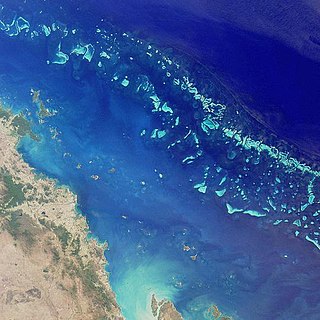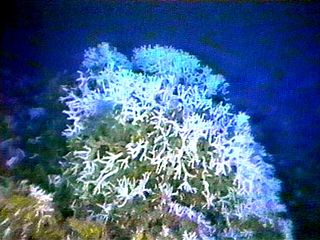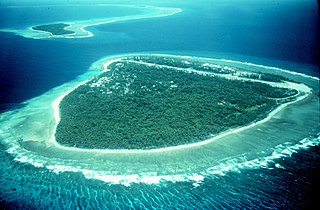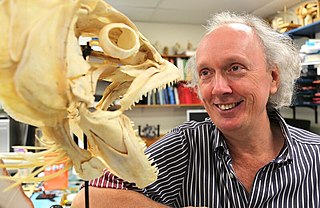
Corals are marine invertebrates within the class Anthozoa of the phylum Cnidaria. They typically form compact colonies of many identical individual polyps. Coral species include the important reef builders that inhabit tropical oceans and secrete calcium carbonate to form a hard skeleton.

The Great Barrier Reef is the world's largest coral reef system composed of over 2,900 individual reefs and 900 islands stretching for over 2,300 kilometres (1,400 mi) over an area of approximately 344,400 square kilometres (133,000 sq mi). The reef is located in the Coral Sea, off the coast of Queensland, Australia, separated from the coast by a channel 100 miles wide in places and over 200 feet deep. The Great Barrier Reef can be seen from outer space and is the world's biggest single structure made by living organisms. This reef structure is composed of and built by billions of tiny organisms, known as coral polyps. It supports a wide diversity of life and was selected as a World Heritage Site in 1981. CNN labelled it one of the seven natural wonders of the world in 1997. Australian World Heritage places included it in its list in 2007. The Queensland National Trust named it a state icon of Queensland in 2006.

A coral reef is an underwater ecosystem characterized by reef-building corals. Reefs are formed of colonies of coral polyps held together by calcium carbonate. Most coral reefs are built from stony corals, whose polyps cluster in groups.

Coral bleaching is the process when corals become white due to various stressors, such as changes in temperature, light, or nutrients. Bleaching occurs when coral polyps expel the algae (zooxanthellae) that live inside their tissue, causing the coral to turn white. The zooxanthellae are photosynthetic, and as the water temperature rises, they begin to produce reactive oxygen species. This is toxic to the coral, so the coral expels the zooxanthellae. Since the zooxanthellae produce the majority of coral pigmentation, the coral tissue becomes transparent, revealing the coral skeleton made of calcium carbonate. Most bleached corals appear bright white, but some are pastel blue, yellow, or pink due to proteins in the coral.

Southeast Asian coral reefs have the highest levels of biodiversity for the world's marine ecosystems. They serve many functions, such as forming the livelihood for subsistence fishermen and even function as jewelry and construction materials. Coral reefs are developed by the carbonate-based skeletons of a variety of animals and algae. Slowly and overtime, the reefs build up to the surface in oceans. Coral reefs are found in shallow, warm salt water. The sunlight filters through clear water and allows microscopic organisms to live and reproduce. The Indian Ocean holds 60% of the world's coastal reefs, 25% are in the Pacific and 15% are in the western Atlantic. There are coral reefs in the Persian Gulf, Madagascar, the Philippines, Hawaiian Islands and off Southeast Asia. Coral reefs have been preserved and identified in rocks over 400 million years old. Coral reefs are actually composed of tiny, fragile animals known as coral polyps. Coral reefs are significantly important because of the biodiversity. Although the number of fish are decreasing, the remaining coral reefs contain more unique sea creatures. The variety of species living on a coral reef is greater than anywhere else in the world. An estimation of 70-90% of fish caught are dependent on coral reefs in Southeast Asia and reefs support over 25% of all known marine species. However, those sensitive coral reefs are facing detrimental effects on them due to variety of factors: overfishing, sedimentation and pollution, bleaching, and even tourist-related damage.
Regime shifts are large, abrupt, persistent changes in the structure and function of ecosystems, the climate, financial systems or other complex systems. A regime is a characteristic behaviour of a system which is maintained by mutually reinforced processes or feedbacks. Regimes are considered persistent relative to the time period over which the shift occurs. The change of regimes, or the shift, usually occurs when a smooth change in an internal process (feedback) or a single disturbance triggers a completely different system behavior. Although such non-linear changes have been widely studied in different disciplines ranging from atoms to climate dynamics, regime shifts have gained importance in ecology because they can substantially affect the flow of ecosystem services that societies rely upon, such as provision of food, clean water or climate regulation. Moreover, regime shift occurrence is expected to increase as human influence on the planet increases – the Anthropocene – including current trends on human induced climate change and biodiversity loss. When regime shifts are associated with a critical or bifurcation point, they may also be referred to as critical transitions.

The Great Barrier Reef is the world's largest reef systems, stretching along the East coast of Australia from the northern tip down to the town of Bundaberg, is composed of roughly 2,900 individual reefs and 940 islands and cays that stretch for 2,300 kilometres (1,616 mi) and cover an area of approximately 344,400 square kilometres (133,000 sq mi). The reef is located in the Coral Sea, off the coast of Queensland in northeast Australia. A large part of the reef is protected by the Great Barrier Reef Marine Park.

Hugh Phillip Possingham, FAA, is the Queensland Chief Scientist and is best known for his work in conservation biology, applied ecology, and basic ecological theory including population ecology. He is also a Professor of Mathematics, Professor of Zoology and an ARC Laureate Fellow in the Department of Mathematics and the School of Biological Sciences at The University of Queensland.

Ove Hoegh-Guldberg, is a biologist and climate scientist specialising in coral reefs, in particular bleaching due to global warming and climate change. He has published over 500 journal articles and been cited over 50,000 times.

Oculina varicosa, or the ivory bush coral, is a scleractinian deep-water coral primarily found at depths of 70-100m, and ranges from Bermuda and Cape Hatteras to the Gulf of Mexico and the Caribbean. Oculina varicosa flourishes at the Oculina Bank off the east coast of Florida, where coral thickets house a variety of marine organisms. The U.S. National Marine Fisheries Service considers Oculina a genus of concern, due to the threat of rapid ocean warming. Species of concern are those species about which the U.S. Government's National Oceanic and Atmospheric Administration (NOAA), National Marine Fisheries Service, has some concerns regarding status and threats, but for which insufficient information is available to indicate a need to list the species under the U.S. Endangered Species Act (ESA). While Oculina is considered a more robust genus in comparison to tropical corals, rising ocean temperatures continue to threaten coral health across the planet.

Jeremy Bradford Cook Jackson is an American ecologist, paleobiologist, and conservationist. He is an emeritus professor at the Scripps Institution of Oceanography, senior scientist emeritus at the Smithsonian Institution, and visiting scientist at the American Museum of Natural History Center for Biodiversity and Conservation. He studies threats and solutions to human impacts on the environment and the ecology and evolution of tropical seas. Jackson has more than 170 scientific publications and 11 books, with nearly 40,000 citations listed on Google Scholar.

Nancy Knowlton is a coral reef biologist and a former Sant Chair for Marine Science at the Smithsonian National Museum of Natural History.

Human impact on coral reefs is significant. Coral reefs are dying around the world. Damaging activities include coral mining, pollution, overfishing, blast fishing, the digging of canals and access into islands and bays. Other dangers include disease, destructive fishing practices and warming oceans. Factors that affect coral reefs include the ocean's role as a carbon dioxide sink, atmospheric changes, ultraviolet light, ocean acidification, viruses, impacts of dust storms carrying agents to far-flung reefs, pollutants, algal blooms and others. Reefs are threatened well beyond coastal areas. Climate change, such as warming temperatures, causes coral bleaching, which, if severe, kills the coral.
The resilience of coral reefs is the biological ability of coral reefs to recover from natural and anthropogenic disturbances such as storms and bleaching episodes. Resilience refers to the ability of biological or social systems to overcome pressures and stresses by maintaining key functions through resisting or adapting to change. Reef resistance measures how well coral reefs tolerate changes in ocean chemistry, sea level, and sea surface temperature. Reef resistance and resilience are important factors in coral reef recovery from the effects of ocean acidification. Natural reef resilience can be used as a recovery model for coral reefs and an opportunity for management in marine protected areas (MPAs).

Isabelle M. Côté is a professor of marine ecology at Simon Fraser University in Canada.

Ruth Deborah Gates was the Director of the Hawaiʻi Institute of Marine Biology and the first woman to be President of the International Society for Reef Studies. Her research was dedicated to understanding coral reef ecosystems, specifically coral-algal symbiosis and the capacity for corals to acclimatize under future climate change conditions. Doctor Gates is most accredited with looking at coral biology and human-assisted coral evolution, known as super corals, as notably seen in the documentary Chasing Coral, available on Netflix.

David Roy Bellwood is an Australian marine biologist. Bellwood studies the ecology, biogeography and evolution of marine fishes, and in 2016 was elected to the Australian Academy of Science.

Human activities affect marine life and marine habitats through overfishing, habitat loss, the introduction of invasive species, ocean pollution, ocean acidification and ocean warming. These impact marine ecosystems and food webs and may result in consequences as yet unrecognised for the biodiversity and continuation of marine life forms.

A marine coastal ecosystem is a marine ecosystem which occurs where the land meets the ocean. Marine coastal ecosystems include many different types of marine habitats, such as estuaries and lagoons, salt marshes and mangrove forests, seagrass meadows and coral reefs, kelp forests and backwaters. Directly and indirectly these provide a vast range of ecosystem services for humans, such as sequestering carbon, cycling nutrients and elements, providing nurseries and fishing grounds for commercial fisheries, preventing coastal erosion and moderating extreme events, as well as providing recreational services and supporting tourism.
Maria Dornelas FRSE is a researcher in biodiversity and professor of biology based at St. Andrew's University. She was made a Fellow of the Royal Society of Edinburgh in 2021. Her research into biodiversity change has challenged previous views, on the growth and decline of coral reefs to understanding global biodiversity with data analysis on how species or ecosystems are changing in the Anthropocene.
















